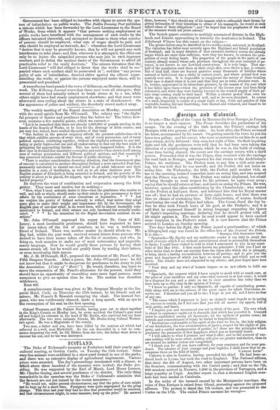SCOTLAND.
'The Duke of Richmond's tenantry at Fochabers held their yearly agri- cultural meeting, at Gordon Castle, on Tuesday the 15th instant. Some eery fine animals were exhibited in a show-yard formed in one of the parks, and there was an extensive display of agricultural implements. Various prizes were awarded. The day's proceedings terminated with a dinner, to which about three hundred of the tenantry were invited; the Duke pre- siding. He was supported by the Earl of March, Lord Henry Lennox, Mr. Charles Goring, and several gentlemen of the district. The only thing -remarkable in the speeches was the Duke of Richmond's admission that the farmers are not yet rained by the recent measures— "He would not, under present circumstances, say that the price of corn might not be kept up for a short time. Foreigners were quite unprepared for the great change This time last year they had no idea that protection would be removed, and t7iat circumstances might, in some measure, keep up the price." He assured
them, however, " that should any of his tenants wish to relinquish their farms,•by giving intimation of their intentions to either of his managers, he would at awe relieve them of their obligations "; and "he hoped that his prophecies of the evil of the measure would not prove correct."
The Scotch papers continue to multiply accounts of distress in the Nigh- lands and Islands, approaching in intensity the destitution in Ireland. The Edinburgh Witness has this report on the subject— The potato-failure may be described in two words—total, universal, in Scotland. The visitation has fallen most severely upon the Highland and Island population of Scotland; and in many districts of that extensive territory scenes are already begun which are more than sufficient, were they but known, to awaken the sym- pathies of every feeling heart. The proportion of the people in the parts of our country already named whose sole provision throughout the year consisted of po- tatoes, is not known to our Lowland countrymen. It is very large. That one- half of the population used them as their staple diet, even thrice a day, is certain. But of that half, there are beyond question many thousands of families where oatmeal or barleymeal was a rarity in current years, and where animal food was scarcely ever seen. It is impossible to exaggerate the misery of those families. Their case is stated when it is just said that they are in total, absolute want. It is, besides, aggravated in its immediate pressure, by the season of the year when it has fallen upon them—when the provision of the former year had been fairly exhausted, and when they were looking forward to the wont'd supply of their po- tato crops coming ready to their hand. Within a shorter period than even six weeks ago, the potato crop promised well, and to be even abundant. In course of a week, frequently in course of a single night or day, fields and patches of this vegetable, looking fair and flourishing, were blasted and withered, and found to be unfit for human food.


























 Previous page
Previous page